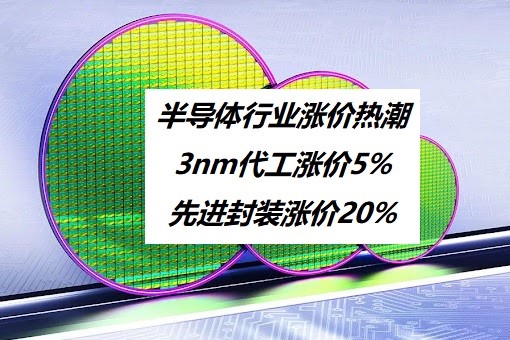In the heart of the global semiconductor industry, TSMC's every move touches the pulse of the industry. With the news of price increases for 3nm foundry and advanced packaging services, an unprecedented wave of semiconductor price increases is spreading rapidly under the leadership of TSMC.
The logic behind the price increase
TSMC's decision to raise prices is not a whim, but a direct reflection of the relationship between supply and demand. As the most advanced chip manufacturing process at present, 3nm technology is naturally expensive to produce. The R&D and production costs of 3nm technology are significantly higher than those of 5nm technology. According to industry analysis, the cost price per wafer of 3nm is about 25% more expensive than that of 5nm. At the same time, the booming development of AI technology has led to a surge in demand for high-performance chips, further driving up the market value of 3nm technology.

Figure: It is said that the price of 3nm foundry will increase by 5%, and the price of advanced packaging will increase by 20%
3nm foundry: the pioneer of price increases
TSMC's 3nm technology is not only a symbol of technological progress, but also a manifestation of market competitiveness. At present, global technology giants such as Nvidia, AMD, Intel, etc. have booked out 3nm production capacity, and orders are even scheduled until 2026. This situation of short supply provides TSMC with a good reason to raise prices. It is rumored that the price increase of 3nm foundry may be more than 5%.
Advanced packaging: another battleground for price increases
In addition to wafer foundry, advanced packaging technology has also become TSMC's core competitiveness. In particular, with the explosive growth of AI applications, the market demand for CoWoS technology has risen sharply. TSMC's CoWoS monthly production capacity is expected to double, but it is still difficult to meet the huge demand in the market, and price increases are imperative. It is rumored that the quotation of advanced packaging may increase by 10%-20% next year.
Customer reactions and strategies
In the face of TSMC's price increase, customers have had mixed reactions. Qualcomm has already taken the lead in responding, with its Snapdragon 8 Gen 4 chip offering a 25% surge from the previous generation. Other customers such as Nvidia, Apple, and AMD are also planning to raise the price of their AI hardware, showing a huge demand for high-end technology.
Industry impact and outlook
TSMC's decision to raise prices will undoubtedly have a profound impact on the entire semiconductor industry. On the one hand, this may increase the cost of downstream electronic products, affecting their pricing strategy and market competitiveness; On the other hand, it could also prompt other semiconductor manufacturers to reevaluate their pricing strategies, triggering a new round of industry reshuffle.
Epilogue
TSMC's price increase is not only an affirmation of its own technical value, but also a direct response to the current supply and demand situation in the semiconductor industry. As an industry leader, how TSMC's decision will affect the future market pattern is worth our continued attention. At the same time, this also presents new challenges and opportunities for other semiconductor companies, and how to maintain competitiveness in the tide of price increases will be a problem they must face.






